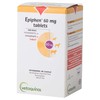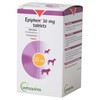Epiphen
Epiphen Tablets for Dogs are an oral tablet used to control epilepsy in dogs. They contain the active ingredient Phenobarbital, which is an antiepileptic drug that will help to reduce the frequency and/or severity of seizures and fits.
Epiphen Tablets are white circular tablets that are plain on both sides.
Epiphen 60mg Tablets for Dogs
£0.24Epiphen 60mg Tablets are indicated for use in the control of epilepsy in dogs. Epiphen contains phenobarbital as the active ingredient, which is an antiepileptic drug that will reduce the...[More info]
Epiphen 30mg Tablets for Dogs
£0.13Epiphen 30mg Tablets are indicated for use in the control of epilepsy in dogs. Epiphen contains phenobarbital as the active ingredient, which is an antiepileptic drug that will reduce the...[More info]
Contra-indications
Not for use in pregnant animals. Do not administer to animals with impaired hepatic function.
Special precautions for use in animals
Withdrawal of phenobarbital or transition to or from another type of antiepileptic therapy should be made gradually to avoid precipitating an increase in the frequency of seizures.
Phenobarbital may reduce the activity of some drugs by increasing the rate of metabolism through induction of drug-metabolising enzymes in liver microsomes.
Use of phenobarbital tablets in conjunction with primidone is not recommended as primidone is predominantly metabolised to phenobarbital.
Smaller quantities dispensed from this bulk pack should be supplied in a container with a child resistant closure.
User Warnings
In case of accidental ingestion seek medical attention immediately advising medical services of barbiturate poisoning. Wash hands thoroughly after use.
Adverse Reactions
Occasionally polyphagia, polyuria and polydipsia have been reported, but these effects are usually transitory and disappear with continued medication.
Toxicity may develop at doses over 20 mg/kg/day or when serum phenobarbital levels rise above 45 microgram/ml.
In the light of isolated reports describing hepatotoxicity associated with combination anticonvulsant therapy, it is recommended that:
1. Hepatic function is evaluated prior to initiation of therapy (e.g. measurement of serum bile acids).
2. Therapeutic phenobarbital serum concentrations are monitored to enable the lowest effective dose to be used. Typically concentrations of 15–45 microgram/ml are effective in controlling epilepsy.
3. Hepatic function is re-evaluated on a regular (6 to 12 month) basis.
4. Seizure activity is re-evaluated on a regular basis.
Use during pregnancy or lactation
In humans, mothers receiving antiepileptic medication have a 6 to 10% incidence of significant abnormality in their offspring. Neonatal sedation and drug dependence may occur if given close to term. Phenobarbital crosses the placental barrier and small amounts are excreted in breast milk. For these reasons, phenobarbital is contraindicated in pregnancy and nursing bitches.
Interaction with other medicinal products and other forms of interaction
Phenobarbital will potentially reduce therapeutic levels of a wide range of drugs due to its inducing effect on hepatic enzymes.
Overdose (symptoms, emergency procedures, antidotes), if necessary
Overdosage may result in coma, severe respiratory and cardiovascular depression, hypotension and shock leading to renal failure and death. Following the recent ingestion of an overdose, the stomach may be emptied by lavage. The prime objectives of management are then intensive symptomatic and supportive therapy with particular attention being paid to the maintenance of cardiovascular, respiratory and renal functions and to the maintenance of the electrolyte balance.
Withdrawal period
Not applicable

